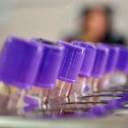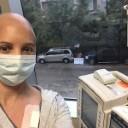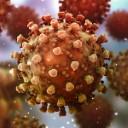-
When COVID-19 Comes Home
I have brain cancer, and my wife is a health care worker. These are some questions we had to consider leading up to and after her diagnosis with COVID-19.
by Adam Hayden
-
What It’s Like to Get a “C” in Graduate School
I was afraid that my thyroid cancer diagnosis would derail my graduate school plans. Instead, it helped shape my career path.
by Carly Flumer
-
Embracing Palliative Care Sooner
Studies show the benefits palliative care can provide to advanced cancer patients, but also highlight inequities in access.
by Jen Tota McGivney
-
International Perspectives on COVID-19 and Cancer
Researchers from around the globe share insights into the outcomes of people with cancer who are infected with the coronavirus.
by Bradley Jones
-
Tests Spot Signs of Cancer in the Blood
At the AACR Virtual Annual Meeting I, researchers presented data on blood tests that aim to supplement current cancer screening and speed up diagnosis.
by Kate Yandell
-
Using Leftover Cancer Drugs to Help Others
Cancer drug repositories that accept unused drugs could provide an affordable source of medications for patients in need, while also providing patients left with extra drugs a way to give back.
by Jon Kelvey
-
Tumor Testing May Help Guide Pancreatic Cancer Treatment
For a small group of pancreatic cancer patients who were able to receive therapies targeting the molecular alterations in their tumors, these matched therapies were associated with longer life.
by Cheryl Platzman Weinstock
-
Facing Cancer and a Pandemic at the Same Time
Cancer patients and their families share stories of fear, love and uncertainty as they find new ways to support each other.
by Jen Tota McGivney
-
Virtual Connection in a Time of Social Distance
Responding to the coronavirus, patient advocates and nonprofits expand existing outreach initiatives and launch new ones.
by Marci A. Landsmann
-
Cancer Treatment During a Pandemic
People being treated for cancer may be at elevated risk of developing severe cases of COVID-19. The coronavirus is also affecting how cancer care is delivered.
by William G. Nelson, MD, PhD
Cancer Talk
Immunotherapy for Early-stage Gastric Cancer
‘Practice-changing’ research shows adding immunotherapy before and after surgery reduced recurrences for early-stage gastric cancer.
by Laura Gesualdi Gilmore
Physical Activity Linked to Lower Colon Cancer RecurrenceParticipating in a structured exercise program after treatment was associated with a reduced risk of recurrence in people who had colon cancer.
by Sandra Gordon
Gaps in Survivorship Care Leave Unmet Needs After Cancer TreatmentA survey of head and neck cancer survivors reveals that many are not getting adequate survivorship care and may not even know it is available.
by Cameron Walker
Improving Communication for Deaf Cancer PatientsAfter a cancer diagnosis, people who are deaf or have hearing problems can struggle if accommodations don’t meet their communication needs.
by Eric Fitzsimmons














